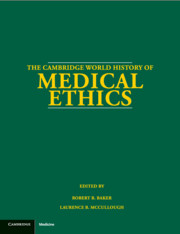Book contents
- Frontmatter
- PART I AN INTRODUCTION TO THE HISTORY OF MEDICAL ETHICS
- PART II A CHRONOLOGY OF MEDICAL ETHICS
- PART III DISCOURSES OF MEDICAL ETHICS THROUGH THE LIFE CYCLE
- PART IV THE DISCOURSES OF RELIGION ON MEDICAL ETHICS
- PART V THE DISCOURSES OF PHILOSOPHY ON MEDICAL ETHICS
- PART VI THE DISCOURSES OF PRACTITIONERS ON MEDICAL ETHICS
- PART VII THE DISCOURSES OF BIOETHICS
- 38 The Discourses of Bioethics in the United States
- 39 The Discourses of Bioethics in the United Kingdom
- 40 The Discourses of Bioethics in Western Europe
- 41 The Discourses of Bioethics in Post-Communist Eastern Europe
- 42 The Discourses of Bioethics in Latin America
- 43 The Discourses of Bioethics in East Asia
- 44 The Discourses of Bioethics in South Asia
- 45 The Discourses of Bioethics in Sub-Saharan Africa
- PART VIII DISCOURSES ON MEDICAL ETHICS AND SOCIETY
- Appendix: Biographies: Who Was Who in the History of Medical Ethics
- Bibliography
- Index
41 - The Discourses of Bioethics in Post-Communist Eastern Europe
from PART VII - THE DISCOURSES OF BIOETHICS
Published online by Cambridge University Press: 28 May 2012
- Frontmatter
- PART I AN INTRODUCTION TO THE HISTORY OF MEDICAL ETHICS
- PART II A CHRONOLOGY OF MEDICAL ETHICS
- PART III DISCOURSES OF MEDICAL ETHICS THROUGH THE LIFE CYCLE
- PART IV THE DISCOURSES OF RELIGION ON MEDICAL ETHICS
- PART V THE DISCOURSES OF PHILOSOPHY ON MEDICAL ETHICS
- PART VI THE DISCOURSES OF PRACTITIONERS ON MEDICAL ETHICS
- PART VII THE DISCOURSES OF BIOETHICS
- 38 The Discourses of Bioethics in the United States
- 39 The Discourses of Bioethics in the United Kingdom
- 40 The Discourses of Bioethics in Western Europe
- 41 The Discourses of Bioethics in Post-Communist Eastern Europe
- 42 The Discourses of Bioethics in Latin America
- 43 The Discourses of Bioethics in East Asia
- 44 The Discourses of Bioethics in South Asia
- 45 The Discourses of Bioethics in Sub-Saharan Africa
- PART VIII DISCOURSES ON MEDICAL ETHICS AND SOCIETY
- Appendix: Biographies: Who Was Who in the History of Medical Ethics
- Bibliography
- Index
Summary
INTRODUCTION
The post-Communist period started with the collapse of the Eastern Block in the late 1980s. This period has been marked by intensive integration of Eastern and Western Europe and the consequent reduction of ideological boundaries among the different parts of Europe. The term, “bioethics,” has come into increasing use in the region, as a result of international cooperation of academics and practitioners from Central and Eastern European countries with bioethics institutions and scholars in North America and Western Europe, as well as the expanding influence of bioethical activities of such international bodies as the Council of Europe, UNESCO, and European Commission.
It should be pointed out that Central and Eastern Europe embraces culturally and economically diverse countries. For example, some of them are still under an authoritarian rule and some others have to cope with the consequences of a recent civil war. In contrast to those mentioned, however, there are also so-called accession countries, which have been making a rapid transition to democratic self-rule and had begun to join the European Union in 2004 (and which, consequently, are often referred to as “new member states”). The diversity of conditions for the development of bioethics in these different countries makes generalizing about them challenging. Nonetheless, it is possible to identify trends that are common to the majority of the countries in the region that result from their decades of exposure to Communist ideologies and practices.
- Type
- Chapter
- Information
- The Cambridge World History of Medical Ethics , pp. 495 - 500Publisher: Cambridge University PressPrint publication year: 2008



